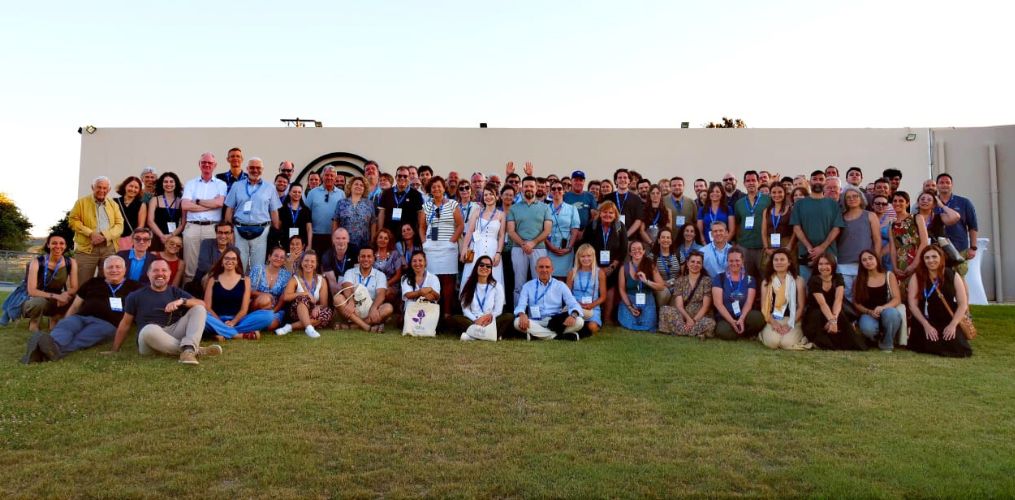European e-Infrastructures, organisations, and research initiatives dedicated to the living world convened in Heraklion, Crete, to explore shared solutions to today’s global challenges. Because the pressures on our biosphere are deeply interconnected, they call for collaborative, systemic, and integrated responses.
On this page, you can learn more about the origins and vision of the Crete Declaration, and add your voice by endorsing it.
Uniting Science for One Health
A brief overview
The interdependence of human, animal, plant, and ecosystem health necessitates systemic, cross-domain collaboration to address global challenges such as emerging diseases, climate change, and biodiversity severe change.
Through the Crete Declaration, Europe’s (e-)infrastructures, organisations, and projects dedicated to the living component of our Biosphere commit to jointly advancing the One Health approach.
In doing so, the signatories aim to strengthen Europe’s resilience and leadership through the sharing of data and expertise, the development of innovative solutions, and the promotion of evidence-based policies.
Why the Crete Declaration
The signatories of the Declaration met in Heraklion, Crete, on 30 June 2025, on the occasion of LifeWatch ERIC’s Biodiversity and Ecosystem e-Science Conference (BEeS 2025).
The motivation behind signing this declaration is the shared awareness of the urgent and interconnected global challenges the world is facing, including emerging diseases, epidemics, and antimicrobial resistance; food safety and sustainable production; water scarcity, environmental contamination and severe biodiversity loss.
In light of these challenges, the signatories recognised the urgent need to join forces and advance the One Health approach, shifting towards systemic and integrated solutions. Their shared ambition is to promote cross-domain research, provide robust scientific evidence for EU and national policies, support and advance open innovation and accelerate adoption of emerging methods.
Objectives
Invest in structured and sustained collaboration on One Health challenges and jointly engage with stakeholders and national and European funding agencies to prioritise actions and work on the realisation of common goals.
Ensure equitable access to relevant data resources, software, workflows, standards, and protocols across domains (both technological and socio-economic).
Establish trusted, inclusive platform for stakeholder engagement, accelerating innovation across public and private sectors in critical areas such as species and ecosystem conservation, sustainable food systems, antimicrobial resistance, and water security.
Provide integrated scientific knowledge to inform effective, evidence-based policymaking and engage citizens. Policies anchored in reliable data are robust and, when rooted in societal participation they will become more feasible, impactful, and widely adopted.

Current Signatories
Europe’s large-scale Research (e-)Infrastructures, organisations and collaborative projects dedicated to understanding the living component of Biosphere.
- Christos Arvanitidis - LifeWatch ERIC, Seville, Spain
- Olga Ameixa - University of Aveiro (RESTORE4Cs), Aveiro, Portugal
- Alberto Basset - University of Salento, LifeWatch ERIC (SC), National Research Council, Lecce, Italy
- Eva Chatzinikolaou - IMBBC, HCMR, LifeWatch ERIC, Heraklion, Greece
- Claudia Coman - MARIS B.V., Nootdorp, Netherlands
- Berta Companys - ICM, CSIC (Project ANERIS), Barcelona, Spain
- Francesco De Leo - IRET, CNR (Project OEMC), Lecce, Italy
- Klaas Deneudt - Flanders Marine Institute (VLIZ) (Project DTO BioFlow), Ostend, Belgium
- Federico Drago - EGI Foundation (Project ENVRI Hub NEXT), Amsterdam, Netherlands
- John Eriksson - Susie Robinson
- Tiziana Ferrari - José Luis Martínez Peña
- Teodor Georgiev - John Eriksson
- Giovanni Giuliano - Giovanni Giuliano
- MARIS - Dick Schaap
- MIRRI-ERIC - Ana Portugal Melo
- SHARE-ERIC - Stefan Gruber
- SHARE-ERIC - Stefan Gruber
- SHARE-ERIC - Stefan Gruber
- SHARE-ERIC - Stefan Gruber
- SHARE-ERIC - Stefan Gruber
- SHARE-ERIC - Stefan Gruber
- SHARE-ERIC - Stefan Gruber
- SHARE-ERIC - Stefan Gruber
- SHARE-ERIC - Stefan Gruber
- SHARE-ERIC - Stefan Gruber
- SHARE-ERIC - Stefan Gruber
- SHARE-ERIC - Stefan Gruber
- ANERIS - Berta Companys
- AQUACOSM-plus/MESOAQUA - Paraskevi (Vivi) Pitta
- BiCIKL - Teodor Georgiev
- Biodiversity Genomics Europe - Robert Waterhouse
- BioDT - Gabriela Zuquim
- Blue-Cloud 2026 - Dick Schaap
- BMD - Niels Raes
- DTO-BioFlow - Klaas Deneudt
- ENVRI-Hub NEXT - Federico Drago
- EVERSE - Fotis Psomopoulos
- GES4SEAS - Heliana Teixeira
- ITINERIS - Antonello Provenzale
- Open-Earth-Monitor - Francesco De Leo
- OSTrails - Natalia Manola
- RESTORE4Cs - Daniel Crespo, Olga Ameixa
- RESTORE4Cs - Daniel Crespo, Olga Ameixa
- RESTORE4Cs - Daniel Crespo, Olga Ameixa
- RESTORE4Cs - Daniel Crespo, Olga Ameixa
- RESTORE4Cs - Daniel Crespo, Olga Ameixa
- RESTORE4Cs - Daniel Crespo, Olga Ameixa
- RESTORE4Cs - Daniel Crespo, Olga Ameixa
- RESTORE4Cs - Daniel Crespo, Olga Ameixa
- RESTORE4Cs - Daniel Crespo, Olga Ameixa
- RESTORE4Cs - Daniel Crespo, Olga Ameixa
- RESTORE4Cs - Daniel Crespo, Olga Ameixa
Publications
- The Crete Declaration is published as a policy brief in the open-science journal Research Ideas and Outcomes (https://riojournal.com). The policy brief containing the Crete Declaration is the latest contribution to the LifeWatch ERIC Strategic Working Plan Outcomes open-science collection in the Research Ideas and Outcomes journal, a one-stop access point to the most important deliverables by the research infrastructure consortium. Link to publication: https://doi.org/10.3897/rio.11.e176120